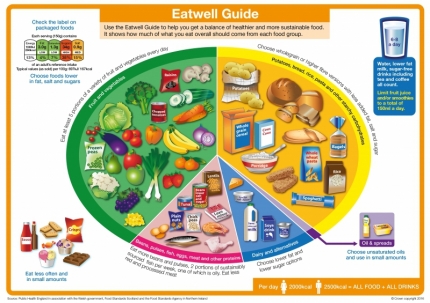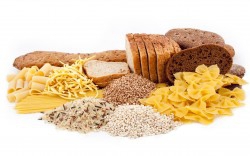Healthy Eating
A healthy lifestyle is recommended for everyone. This includes following a healthy diet, keeping active and maintaining a healthy weight.
The Eatwell Guide shows how much of what we eat overall should come from each food group to achieve a healthy, balanced diet.
You do not need to achieve this balance with every meal but try to get the balance right over a day or even a week.

Please use the following link to explore the interactive Eatwell Guide:
http://www.nhs.uk/Livewell/Goodfood/Pages/the-eatwell-guide.aspx
A helpful portion guide for meals is to aim for roughly equal amounts starchy carbohydrates, vegetables (cooked or salads) and lean protein (fish, lean meat, eggs, Quorn, tofu, etc.)
For weight loss, aim for: half plate vegetables, quarter plate starchy carbohydrates and quarter plate lean protein.
 Carbohydrates
Carbohydrates
Carbohydrates are an important source of energy. All carbohydrates that you eat and drink are broken down into glucose. It is only food containing carbohydrate that will directly affect blood glucose levels. There are two types of carbohydrate: starch and Sugar.
Starchy carbohydrates
Starchy foods include bread, potatoes, pasta, rice, grains and cereals. Although these can be healthy, consider the following points:
- Carbohydrates have the potential to increase your blood glucose levels. The larger the portion of carbohydrate, the higher your blood glucose levels will be.
- Choosing starchy foods that are low glycaemic index (GI) may have less of an effect on your blood glucose levels as they are broken down slowly. Examples of low GI foods include - granary, rye or sourdough bread, pasta, oats and wholewheat cereals.
- Combining carbohydrates with lean protein and vegetables helps to slow digestion and so cause less of a rise in blood glucose.
- Blood glucose levels are normally better controlled if you spread your intake of carbohydrates over the day rather than saving it until the main meal of the day.
Sugar (added)
 Sugary foods and drinks can increase blood glucose quickly, they are often high in energy and can contribute to weight gain. They could also cause tooth decay, especially if eaten in-between meals. Cut down on sugary fizzy drinks, alcoholic drinks, cakes, chocolates, biscuits and sweet pastries.
Sugary foods and drinks can increase blood glucose quickly, they are often high in energy and can contribute to weight gain. They could also cause tooth decay, especially if eaten in-between meals. Cut down on sugary fizzy drinks, alcoholic drinks, cakes, chocolates, biscuits and sweet pastries.
Sugar (natural)
Natural sugars are found in fruit (fructose) as well as milk and yoghurt (lactose), these tend to break down slowly and should be included as part of a healthy diet. Choose whole fruit rather than juices or smoothies and have 1 portion at a time. A portion of fruit is 80g or the amount that fits comfortably in 1 cupped hand.